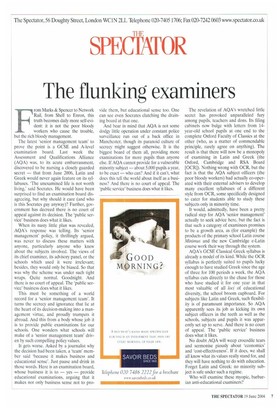The flunking examiners
..F
_ rom Marks & Spencer to Network Rail, from Shell to Enron, this truth becomes daily more self-evident: it is not the poor bloody workers who cause the trouble, but the rich bloody management.
The latest 'senior management team' to prove the point is a GCSE and A-level examination board. Last week the Assessment and Qualifications Alliance (AQA) was, to its acute embarrassment, discovered to be nursing a closely guarded secret — that from June 2006, Latin and Greek would never again feature on its syllabuses. 'The unexamined life is not worth living,' said Socrates. He would have been surprised to find an examination board disagreeing, but why should it care (and who is this Socrates guy anyway)? Further, government has decreed there is no court of appeal against its decision. The 'public service' business does what it likes.
When its nasty little plan was revealed, AQA's response was telling. Its 'senior management' policy, it thrillingly argued, was never to discuss these matters with anyone, particularly anyone who knew about the subjects involved. The views of its chief examiner, its advisory panel, or the schools which used it were irrelevant; besides, they would only be biased. So that was why the scheme was under such tight wraps. Quite normal. Goodnight. And there is no court of appeal. The 'public service' business does what it likes.
This must be something of a world record for a 'senior management team'. It turns the secrecy and ignorance that lie at the heart of its decision-making into a management virtue, and proudly trumpets it abroad. And this from a body whose job it is to provide public examinations for our schools. One wonders what schools will make of a 'senior management team' driven by such compelling policy values.
It gets worse. Asked by a journalist why the decision had been taken, a 'team' member said 'because it makes business and educational sense'. Just pause and drink in those words. Here is an examination board, whose business it is to — yes — provide educational examinations, arguing that it makes not only business sense not to pro
vide them, but educational sense too. One can see even Socrates clutching the draining board at that one.
And bear in mind that AQA is not some dodgy little operation under constant police surveillance run out of a back office in Manchester, though its paranoid culture of secrecy might suggest otherwise. It is the biggest board of them all, providing more examinations for more pupils than anyone else. If AQA cannot provide for a vulnerable minority subject — about 5,000 pupils a year, to be exact — who can? And if it can't, what does this tell the world about itself as a business? And there is no court of appeal. The 'public service' business does what it likes. The revelation of AQA's wretched little secret has provoked unparalleled fury among pupils, teachers and dons. Its filing cabinets now bulge with letters from 14year-old school pupils at one end to the complete Oxford Faculty of Classics at the other (who, as a matter of commendable principle, rarely agree on anything). The result is that there will now be a monopoly of examining in Latin and Greek (the Oxford, Cambridge and RSA Board [OCR]). Nothing wrong with OCR, but the fact is that the AQA subject officers (the poor bloody workers) had actually co-operated with their external advisers to develop many excellent syllabuses of a different style from OCR, some specifically designed to cater for students able to study these subjects only in minority time.
It would, admittedly, have been a pretty radical step for AQA 'senior management' actually to seek advice here, but the fact is that such a category of examinees promises to be a growth area, as (for example) the products of the primary school Latin course Minirnus and the new Cambridge e-Latin course work their way through the system.
AQA's GCSE Classical Greek syllabus is already a model of its kind. While the OCR syllabus is perfectly suited to pupils lucky enough to have studied Greek since the age of three for 100 periods a week, the AQA syllabus cuts directly to the chase for those who have studied it for one year in that most valuable of all loci of educational diversity, the school broom cupboard. For subjects like Latin and Greek, such flexibility is of paramount importance. So AQA apparently sees its job as kicking its own subject officers in the teeth as well as the schools, subjects and pupils it was apparently set up to serve. And there is no court of appeal. The 'public service' business does what it likes.
No doubt AQA will weep crocodile tears and sermonise piously about 'economics' and 'cost-effectiveness'. If it does, we shall all know what its values really stand for, and they will have nothing to do with education. Forget Latin and Greek: no minority subject is safe under such a regime.
Who will examine these myopic, barbarian anti-educational examiners?


































































 Previous page
Previous page